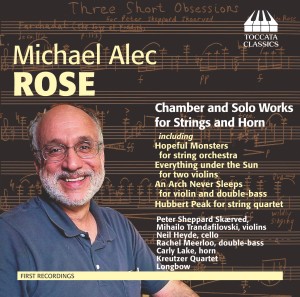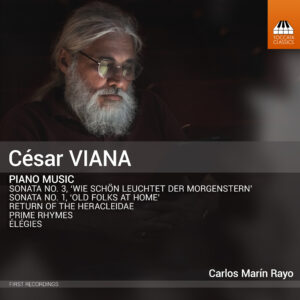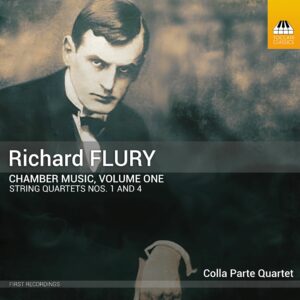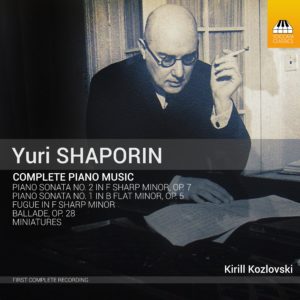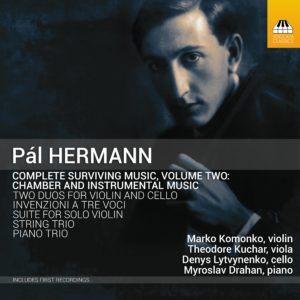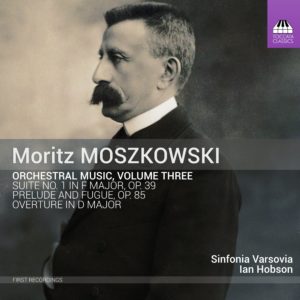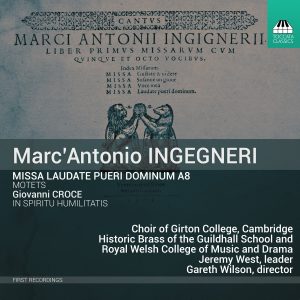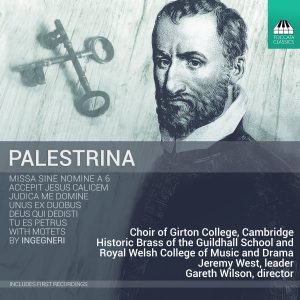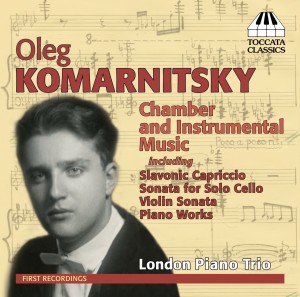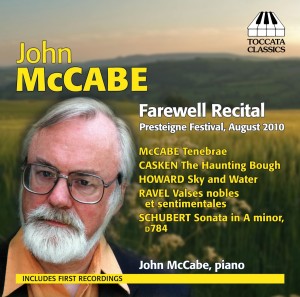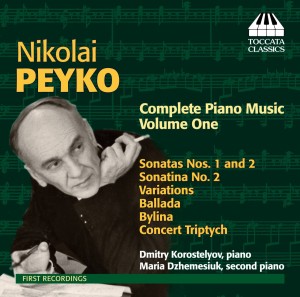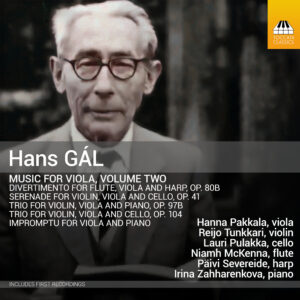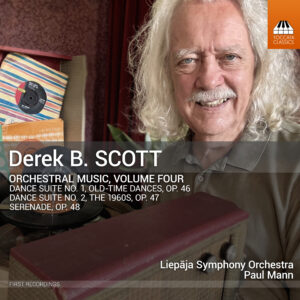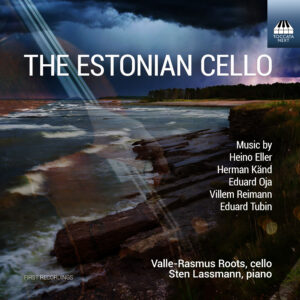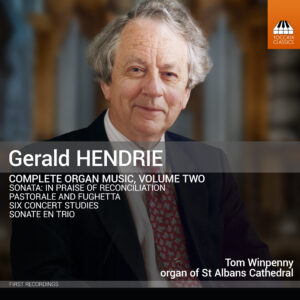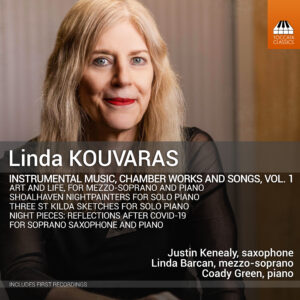Search Results for "The Black Alley Newty Ping" – Page 13
Showing results for black alley net ping
Michael Alec Rose: Chamber and Solo Works for Strings and Horn
In 2004 the American composer Michael Alec Rose (born in 1959 in Philadelphia) met the English violinist Peter Sheppard Skærved. That meeting sparked off a productive friendship: Rose has since written a number of works for Sheppard Skærved and his musician colleagues, pieces marked by striking emotional directness, balancing warm lyricism and mordant wit.
Michael Alec Rose, bell
Peter Sheppard Skærved, violin, director
Mihailo Trandafilovski, violin
Morgan Goff, viola
Neil Heyde, cello
Kreutzer Quartet, string quartet
Rachel Meerloo, double-bass
Carly Lake, horn
Longbow, ensemble
César Viana: Piano Music
The Portuguese composer César Viana – born in England, in 1963, and now resident in Spain – is an all-round musician: conductor, pianist, early-music enthusiast, folklorist and flautist, with a special interest in the shakuhachi, the Japanese bamboo flute. His resulting familiarity with Zen Buddhism has left its mark on his music, where the clean lines of Japanese art combine with a fondness for the contrapuntal textures that form the basis of much European art-music – imagine Bach and Hindemith in the formal elegance of a stone garden, warmed by a touch of western wit.
Carlos Marin Rayo, piano
Richard Flury: Chamber Music, Volume One
The exploration of the music of the Swiss composer Richard Flury (1896–1967) on Toccata Classics now turns to his chamber output, with this first recording of his String Quartets Nos. 1 and 4. Flury was himself a gifted violinist, and these works – written for personal pleasure and for musician friends – were composed with an intimate familiarity with the medium. In the fourteen years between these two quartets, Flury’s musical language consolidated, from the early foray into mild modernism heard in No. 1 into the rich, late-Romantic aesthetic of No. 4.
Colla Parte Quartet
Georg Jacobi and Susanna Holliger, violins
Friedemann Jähnig, viola
Eva Simmen, cello
Yuri Shaporin: Complete Piano Music
With its roots in the tradition of Borodin and Mussorgsky, the music of the Ukrainian- born Soviet composer Yuri Shaporin (1887–1966) sits between the late Romanticism of Skryabin and the harder edges of Shostakovich and Prokofiev, blending a mastery of counterpoint with an acute sense of Russian keyboard colour. In Shaporin’s piano music his fondness for the epic – expressed in two large-scale sonatas and a mighty passacaglia – is contrasted with a number of gentle, almost whimsical miniatures.
Kirill Kozlovski, piano
Pál Hermann: Complete Surviving Music, Volume Two
Pál Hermann, born in Budapest in 1902, was not only one of the leading cellists of his generation; he was also an important composer, one of the major figures in Hungarian music in the generation after his teachers Bartók and Kodály. But since only two of his works were published before his early death – in 1944, at the hands of the Nazis – and many more of them were lost, he has not had the esteem that he deserves. The works on this second volume of his surviving compositions – here mostly chamber works for strings, several in their first recordings – have the wiry humour, sprung and spiky rhythms and Hungarian melos that mark him out as a worthy successor to Bartók – and hints at how much was lost with his murder.
Marko Komonko, violin
Theodore Kuchar, viola (Tracks 9, 10, 15)
Denys Lytvynenko, cello (Tracks 1–3)
Myroslav Drahan, piano (Track 16)
Moritz Moszkowski: Orchestral Music, Volume Three
The Polish composer Moritz Moszkowski (1854–1925) is best remembered for a handful of virtuoso piano pieces, but he also produced a substantial body of orchestral music, most of it unperformed for a century or more. This third volume presents his very first orchestral work, a strikingly assured Overture in D major, written when he was seventeen, and his last, a sombre, dignified and deeply felt Prelude and Fugue for strings, composed on the death of his mother in 1910. Between them comes Moszkowski’s First Orchestral Suite, from 1885, a joy from start to finish, with one delightful inspiration following another in a daisy-chain of dance-rhythms, memorable tunes and instrumental colour.
Sinfonia Varsovia
Ian Hobson, conductor
Andrzej Krzyżanowski, flute (Track 8)
Marc’Antonio Ingegneri: Missa Laudate pueri Dominum
The Cremonese composer Marc’Antonio Ingegneri (c. 1535/36–92) is chiefly remembered as the teacher of Claudio Monteverdi while, for well nigh 500 years, his own achievements were left to sit in the shadows. This pioneering recording reveals Ingegneri to have been one of the masters of his age, writing music of breathtaking richness and beauty: the polychoral works heard here combine learned, intricate counterpoint with the kind of sheer sonic thrill that brings a shiver of physical excitement.
Choir of Girton College, Cambridge
Historic Brass of the Guildhall School and Royal Welsh College of Music and Drama
Jeremy West, leader
James Mitchell and Wayne Weaver, organ
Gareth Wilson, director
First recordings
Palestrina: Missa sine nomine a6
Renaissance polyphony is generally held to be stately, calm, reassuring. But this pro- gramme of Palestrina’s six-part Missa sine nomine, complemented by five of his motets and three by Marc’Antonio Ingegneri (c. 1535/36–92), was recorded after the Choir of Girton College, Cambridge, had undertaken a tour of Israel and Palestine. There the music and its texts (‘How shall we sing the Lord’s song in a strange land?’) took on an extraordinary poignancy, with the dispossession and desperation of thousands of years ago animating the restrained dignity of Palestrina’s counterpoint with an unexpectedly topical intensity.
Choir of Girton College, Cambridge
Historic Brass of the Guildhall School and Royal Welsh College of Music and Drama
Jeremy West, leader
James Mitchell, organ (Track 8)
Lucy Morrell, organ (Track 13)
Gareth Wilson, director
Oleg Komarnitsky: Chamber and Instrumental Music
In his short life the Moscow-born Oleg Komarnitsky (1946-98) produced music in a wide variety of genres — orchestral, choral, chamber, instrumental and more, not least works for children — but almost none of it has been recorded before; it wasn't even heard outside Russia before 1996. Komarnitsky's music is accessible and lyrical, with the Slavic melancholy which colours the string works here (apparently all that survives of his chamber music) balanced by the buoyant and innocent humour of his piano music, with its echoes of Prokofiev and Shostakovich.
London Piano Trio, piano trio
Robert Atchison, violin
David Jones, cello
Olga Dudnik, piano
John McCabe: Farewell Recital
On 29 August 2010, at the Presteigne Festival on the Welsh borders, John McCabe gave his last public piano recital, bringing to an end a career as solo pianist that had lasted half a century. McCabe — born in Liverpool in 1939 and a composer-pianist in the tradition of Beethoven and Rachmaninov — has always championed the music of his contemporaries alongside his own and that of the masters of the past, and this farewell recital included two works by friends and colleagues and his own grandiose Tenebrae.
John McCabe, piano
Nikolai Peyko: Complete Piano Music, Volume One
The Russian composer Nikolai Peyko (1916-95) studied with Myaskovsky at the Moscow Conservatoire, where he later became Shostakovich's teaching assistant and then an important teacher in his own right. Peyko's piano music shares Shostakovich's fondness for irony and Prokofiev's for driving march-rhythms and playful good humour and, as with so many Russian composers, the sound of bells can often be heard. Each of the two CDs in this complete recording of his piano music ends with one of Peyko's two works for two pianos — the first time that any of this music has been heard in its entirety.
Dmitry Korostelyov, piano
Maria Dzhemesiuk, piano
Hans Gál: Music for Viola, Volume Two
Hans Gál (1890–1987) wrote extensively for the viola, first as a major composer in the German-speaking world in the 1920s and ’30s, and then as a leading cultural figure in post-War Edinburgh, where he had taken refuge after the Nazis seized power in his native Austria. This second volume of his music for viola spans four decades, with four trios from before and after that dislocation, each with its own background, sound-world and personality, although they are unified by Gál’s gift for melody, counterpoint and poised, elegant chamber writing.
Hanna Pakkala, viola
Reijo Tunkkari, violin
Lauri Pulakka, cello
Niamh McKenna, flute
Päivi Severeide, harp
Irina Zahharenkova, piano
Derek B. Scott: Orchestral Music, Volume Four
Derek Scott, born in Birmingham in 1950, has a long history of engagement with the British music hall and other forms of light entertainment, as both historian and performer. Many of his own compositions attest to this interest in popular styles, with his craftsmanship and natural feeling for a good tune producing music of immediate appeal. One of his two recent Dance Suites takes its cue from ska, the twist and other enthusiasms from the early 1960s, and the other from older dance favourites. Time was when works like Arthur Benjamin’s Jamaican Rumba and Percy Faith’s arrangement of Alfvén’s Swedish RhapsodyNo. 1 could be heard on every domestic radio and record-player; these good-natured Dance Suites recapture some of that lost innocence and its relaxed energy – but his Serenade, another recent composition, touches gently on deeper feelings.
Liepāja Symphony Orchestra
Paul Mann, conductor
The Estonian Cello
The strength and richness of Estonian classical music has its origins in two contrasting schools – the international outlook taught by Heino Eller in Tartu and the craftsmanship fostered by Artur Kapp in Tallinn. This album presents Eller’s complete output for cello and piano in its first recording, complemented by works by two of his more important students, Eduard Oja and Eduard Tubin. Villem Reimann and Herman Känd, both students of Kapp, had very different careers, Reimann an established professor in Soviet Estonia, and Känd dying unknown in American exile at only 46. This is the first recording of any of his music in over half a century.
Valle-Rasmus Roots, cello
Sten Lassmann, piano
Gerald Hendrie: Complete Organ Music, Volume Two
The organ music of Gerald Hendrie – born in England in 1935 but resident in France since 1996 – encompasses a huge range of influences, among them the organist-composers who went before him (not least Franck, Dupré and Messiaen), dodecaphony, mediaeval plainchant and modality and jazz. The resulting works are as varied as the styles that fed into them, from grandiose to gentle, from severe to whimsical, from lyrical to lively. The mighty, 25-minute Sonata: In Praise of Reconciliation uses whimsical references to two cities bombed in the Second World War – the ‘Coventry Carol’ and the ‘Dresden Amen’ – to make a monumental plea for peace.
Tom Winpenny, organ of St. Albans Cathedral
Linda Kouvaras: Instrumental Music, Chamber Works and Songs, Volume One
As with many other Australian composers, the music of Linda Kouvaras (b. 1960) has a strong sense of wide-open spaces, expressed in lyrical, elegiac melodic lines that soar over freewheeling Lisztian piano textures and atmospheric echoes of French Impressionism. In this first album of a series presenting all of her instrumental works, chamber music and songs written since 1991, she also addresses two major contemporary issues, with a duo for saxophone and piano exploring the human response to the COVID-19 pandemic and a song-cycle confronting domestic violence from a woman’s viewpoint.
Justin Kenealy, saxophone
Linda Barcan, mezzo-soprano
Coady Green, piano
Stay In the Know
JOIN THE TOCCATA NEWSLETTER
"*" indicates required fields
By visiting our site, you agree to our privacy policy regarding cookies, tracking statistics, etc.
